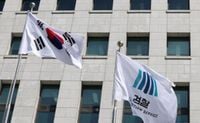After more than three years of legal battles, the first instance sentencing trial for the notorious Daejang-dong development corruption case has reached a critical juncture. On June 27, 2025, the Seoul Central District Court Criminal Division 22, presided over by Judge Jo Hyung-woo, heard the prosecution's sentencing requests for five key figures implicated in the scandal that has rocked South Korea's political and business spheres.
The defendants include Yoo Dong-gyu, former head of the Planning Division at Seongnam City Development Corporation; Kim Man-bae, major shareholder of Hwacheon Daeyu Asset Management; lawyers Nam Wook and Jeong Min-yong; and accountant Jeong Young-hak. All stand accused of orchestrating a scheme that yielded astronomical illicit profits during the Daejang-dong development project between 2014 and 2015.
The prosecution laid out a stark portrayal of the defendants’ roles and the scale of wrongdoing. Yoo Dong-gyu was described as a "key figure" and "connection" between private developers and public officials, acting as a conduit for bribes and favors. The prosecution noted that Yoo initially denied his involvement but eventually "opened the door to the truth," enabling the exposure of the corruption’s full extent. For Yoo, the prosecution requested a prison sentence of seven years, a fine of approximately 1.74 billion won (about $1.4 million), and the forfeiture of 852 million won.
Kim Man-bae, the major shareholder of Hwacheon Daeyu Asset Management, was identified as the mastermind who directly lobbied the highest-ranking officials to secure illicit business rights. He is also considered the largest beneficiary of the scheme, having reaped the most significant profits from the scandal. The prosecution sought a 12-year prison term for Kim, along with a staggering forfeiture of roughly 611.2 billion won (over $470 million). The prosecution criticized Kim for making "unreasonable excuses" throughout the investigation and trial, accusing him of attempting to conceal his crimes and shift blame onto accomplices.
Lawyers Nam Wook and Jeong Min-yong also faced serious charges. Nam, who followed Kim in gaining substantial profits, was said to have facilitated the scheme by recruiting Jeong Young-hak into the Seongnam City Development Corporation and helping craft customized public offering guidelines that favored private developers. The prosecution requested seven years in prison and the forfeiture of 101 billion won for Nam. Meanwhile, Jeong Min-yong, who joined the corporation at Jeong Young-hak’s recommendation and assisted the private developers, faced a five-year prison request, a fine of 7.4 billion won, and a forfeiture of 37 billion won. The prosecution emphasized that although Jeong’s involvement was influenced by instructions from Yoo and Nam, his responsibility remains significant due to the conveniences he provided and the large sums he received.
Accountant Jeong Young-hak was portrayed as the "brain" behind the operation, an urban development expert who orchestrated much of the scheme’s progress. The prosecution highlighted that the entire process followed Jeong’s plan, and despite no special circumstances, he shifted to denying the crimes during the trial, which the prosecution argued warranted a harsh penalty. They requested a 10-year prison sentence and a forfeiture of approximately 64.7 billion won.
The prosecution framed the entire Daejang-dong development project as a scandal where private developers, unable to secure business rights through legitimate means, resorted to bribery and election support to manipulate public officials in Seongnam City and the development corporation. This resulted in the defendants pocketing illicit profits totaling 788.6 billion won (around $600 million), while local residents bore the financial losses and damage.
Highlighting the broader implications, the prosecution stressed that public trust in the fairness and transparency of development projects has been severely damaged, calling for "strict legal judgment" to restore confidence. They urged the court to impose stringent sentences to send a clear message about the consequences of corruption.
This trial, often referred to as the "Daejang-dong main case," first saw indictments in October 2021. Since the initial preparatory hearing in December 2021, the proceedings have spanned three and a half years, underscoring the complexity and high-profile nature of the case.
Earlier in the trial, the court summoned Lee Jae-myung, the former mayor of Seongnam and current President of South Korea, who was the ultimate decision-maker during the Daejang-dong project. Despite five summons, Lee did not appear in court. Subsequently, Jeong Jin-sang, former head of the Democratic Party’s representative office, was called as a witness but refused to testify to both the prosecution and the court.
Lee Jae-myung himself faces separate charges alleging that, while serving as Seongnam mayor, he approved a development structure that favored private developers, resulting in 788.6 billion won in illicit profits and causing 489.5 billion won in losses to the Seongnam City Development Corporation. His trial is ongoing in a different court division.
As the first instance sentencing arguments concluded on June 27, the court is expected to deliver its verdict within one to two months, likely by the end of July 2025. The outcome will mark a significant milestone in one of South Korea’s most contentious and politically charged corruption cases.


